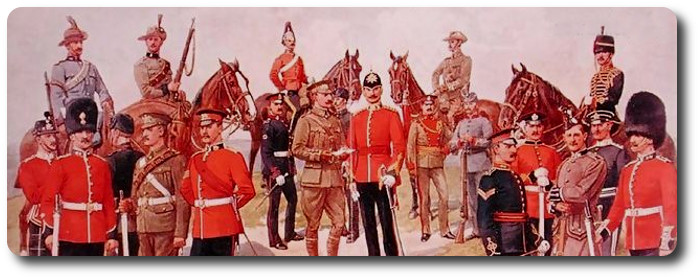Topic: European Armies

Impressions of Foreign Armies (1911)
Lieut.-Col. Morrison Has Good Words For the British
Ottawa Citizen, 20 April 1911
An address of very much interest and benefit was given by Lieut.-Col. Morrison, D.S.O., before the officers of the Governor General's Foot Guards last night in their mess room. The lecture was on the impressions he had received in visiting the armies of the different European countries in his recent three-month' tour abroad. During the tour he had an opportunity of studying the armies of France, Germany, Belgium and Great Britain. It was, indeed, very interesting and not only all the Guards' officers were present, but as well many officers of other city units and among the visitors was Lieut.-Col. Grant, P.M.O., of the Toronto District.
Lieut.-Col. Morrison toured most of France in an auto and during his visit there, which lasted a month, he had an opportunity of seeing the regular soldiers there in all kinds of work. He saw them in ceremonial work in connection with the funeral of General Brun, late minister of war. He saw them in field work and on the march. The French soldiers do a tremendous amount of marching, day in, day out. They specialize in this and are claimed to be the best marchers in Europe. The French soldiers are conscripts and altogether he was now favourably impressed with them. They did not have much snap, they were poorly dressed on the streets, the horses were not nearly so good as the British horses, and their equipment and rifles he did nor consider could class with the British or Canadian equipment at all. On the street a member of the Canadian rural militia would well compare with them in appearance. Their method of training he did not consider was very up-to-date. While the artillery is considered about the best in Europe, he did not think it as good as the British. The staff work of the French army seemed good.
The Belgian army, while small, about 50,000 strong, was better in nearly every particular. The militia was exceptionally interesting. Every man has to serve in the militia and they have to drill every Sunday night, and therefore get the name of Sunday soldiers.
In England he visited Woolwich and Aldershot. In the latter General Smith-Dorrien, who commanded the Canadians in South Africa, was in command. He was much impressed with the great amount of work the regular soldiers in Great Britain sis. They were trained physically to a very high standard and every morning were out on the drill grounds at six o'clock, whether cold or warm. The go out winter nights and bivouac in the open, either in a regiment, a brigade or a division. They are roughed all over the country and are ready for active service at any time, hardened and prepared for a campaign in any part of the world. "The British Tommy is without doubt the best soldier I saw." He pointed out that all the regiments, Guards included, were put through this severe discipline and the officers worked exceedingly hard.
The equipment was also the best. Since the British standing army was comparatively small, Britain can afford to equip it better. They, he believed, made up in quality what the others had in quantity.
He spoke of getting special permission from the German Kaiser to visit certain German fortifications. He gave and interesting account of their methods of musketry instruction. There were no fixed ranges, no bulls-eye targets. He considered that the Germans produced the nearest to active service conditions in their musketry of any nation he visited. He remarked on the great precision for which the German army is noted and spoke of the economical way in which everything was done, particularly the musketry instruction.
His tour had nevertheless impressed him more and more with the efficiency of the Canadian militiaman. Many of these countries have not seen war for many years and the Canadian militia had shone up well in seven fights in the past 100 years. They are eager to learn and are naturally military. He gave instances to prove how efficient they had shown themselves to be. He went away from Canada slightly in favour of a limited form of conscription, but on seeing the British soldier who volunteered and the European armies who did not, he came back strong in the belief that the volunteer soldier was far the better.
Lieut.-Col. Woods expressed appreciation for the lecture and said that his impressions of the British soldier were exactly the same as Col. Morrison's.

